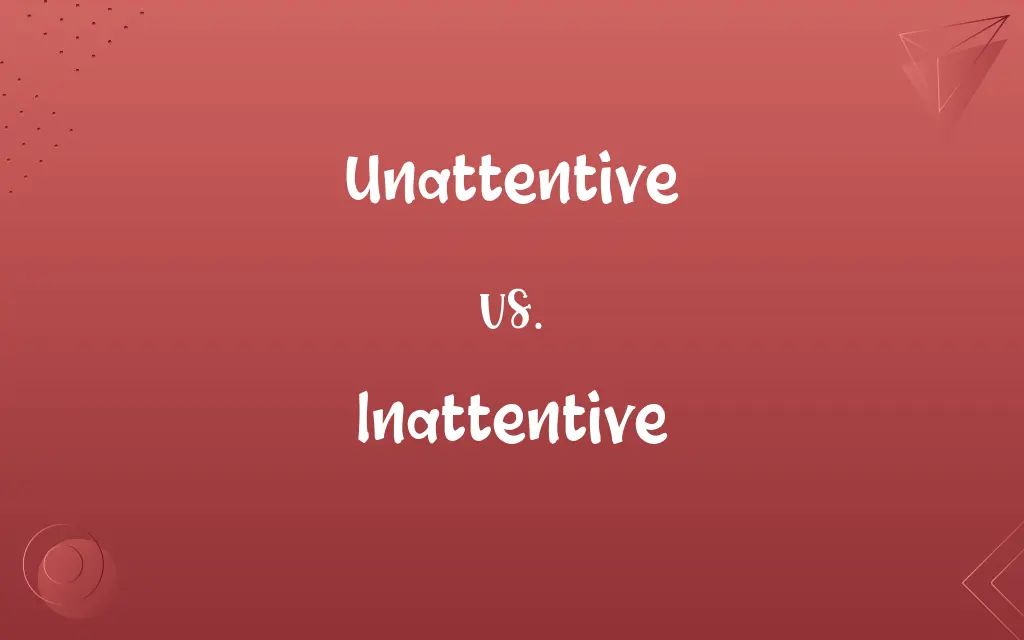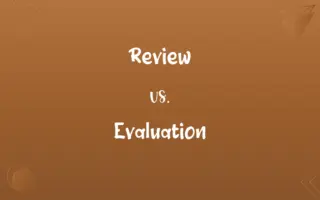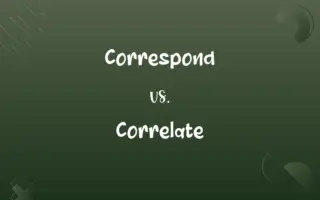Unattentive vs. Inattentive: Know the Difference

By Shumaila Saeed || Published on February 16, 2024
"Unattentive" is not a standard English word, while "Inattentive" describes a lack of attention or carelessness.

Key Differences
"Unattentive" and "Inattentive" are terms often used interchangeably in casual speech, but they possess subtle differences in connotation and usage. "Unattentive" is less commonly used and can imply a more deliberate disregard or failure to pay attention. In contrast, "Inattentive" is more widely recognized and generally suggests a lack of attention, often unintentional or due to distraction. Both words describe a lack of attentiveness, but "Unattentive" often carries a slightly more negative implication, suggesting a willful neglect.
Shumaila Saeed
Feb 16, 2024
In educational settings, a student described as "unattentive" might be perceived as deliberately ignoring instructions or not engaging actively, whereas an "inattentive" student might be simply distracted or momentarily unfocused. The word "Inattentive" is more likely to be used in clinical or psychological contexts, such as describing symptoms of Attention Deficit Hyperactivity Disorder (ADHD). Meanwhile, "Unattentive" might be used in more general contexts to imply a lack of proper attention or care, though it's less precise than "Inattentive."
Shumaila Saeed
Feb 16, 2024
In the context of customer service, an "unattentive" employee might be seen as someone who is not fulfilling their duties properly, perhaps due to a lack of interest or concern. On the other hand, an "inattentive" employee might be simply temporarily distracted or overwhelmed, without the implication of deliberate negligence. "Unattentive" often conveys a more serious level of disregard compared to "Inattentive," which might be viewed as a less severe or temporary lapse in attention.
Shumaila Saeed
Feb 16, 2024
In literature, the choice between "unattentive" and "inattentive" can subtly change the characterization of a subject. An "unattentive" character might be portrayed as someone who purposefully ignores details or other characters, showing a form of passive resistance or disinterest. An "inattentive" character, however, might be depicted as simply lost in thought, absent-minded, or preoccupied, without the implication of intentional neglect. This distinction can be crucial in conveying the correct nuances in character development and storytelling.
Shumaila Saeed
Feb 16, 2024
In everyday communication, the choice between these two words can affect the tone and implication of the message. Saying someone is "unattentive" might imply a degree of criticism or dissatisfaction, suggesting a need for improvement in their attentiveness. In contrast, describing someone as "inattentive" is often a more neutral observation, acknowledging a momentary lack of attention without strong judgment. Both terms ultimately communicate a similar idea of not paying attention, but the nuances they carry are important in conveying the speaker's intent and the context of the situation.
Shumaila Saeed
Feb 16, 2024
ADVERTISEMENT
Comparison Chart
Validity in English
Not a recognized word in standard English
A valid English word
Shumaila Saeed
Feb 16, 2024
Meaning
None, due to its non-standard status
Lacking attention or carelessness
Shumaila Saeed
Feb 16, 2024
Context
Seen in erroneous or informal contexts
Used in both formal and informal contexts
Shumaila Saeed
Feb 16, 2024
Impact
Can cause confusion or be seen as an error
Clearly communicates a lack of attention
Shumaila Saeed
Feb 16, 2024
ADVERTISEMENT
Unattentive and Inattentive Definitions
Unattentive
Incorrect form of expressing lack of attention.
The teacher corrected the student's use of 'unattentive' to 'inattentive.'
Shumaila Saeed
Jan 13, 2024
Inattentive
Failing to attend to responsibilities.
The inattentive babysitter failed to notice the child's mischief.
Shumaila Saeed
Jan 13, 2024
Unattentive
Not an established English word.
He wrote 'unattentive' in the report, which was marked as a spelling error.
Shumaila Saeed
Jan 13, 2024
Inattentive
Lacking concentration or attention.
The inattentive student missed important details in the lecture.
Shumaila Saeed
Jan 13, 2024
Unattentive
A common error in language use.
His email contained the word 'unattentive,' revealing his unfamiliarity with correct English.
Shumaila Saeed
Jan 13, 2024
ADVERTISEMENT
Inattentive
Neglecting to give proper attention.
Her inattentive attitude during meetings was noted by her colleagues.
Shumaila Saeed
Jan 13, 2024
Unattentive
Often a misspelling of "inattentive."
In her essay, she mistakenly wrote 'unattentive' instead of 'inattentive.'
Shumaila Saeed
Jan 13, 2024
Inattentive
Showing a lack of interest or care.
He was inattentive to his guest's needs, making them feel unwelcome.
Shumaila Saeed
Jan 13, 2024
Unattentive
Not found in recognized dictionaries.
Searching for 'unattentive' in the dictionary yielded no results.
Shumaila Saeed
Jan 13, 2024
Inattentive
Not paying careful attention.
Inattentive driving can lead to serious accidents on the road.
Shumaila Saeed
Jan 13, 2024
Inattentive
Of or pertaining to a lack of attention; not paying attention; careless.
He was inattentive in class and did not do well in his exams.
Shumaila Saeed
Jan 10, 2024
Inattentive
Not attentive; not fixing the mind on an object; heedless; careless; negligent; regardless; as, an inattentive spectator or hearer; an inattentive habit.
Shumaila Saeed
Jan 10, 2024
Inattentive
Not showing due care or attention;
Inattentive students
An inattentive babysitter
Neglectful parents
Shumaila Saeed
Jan 10, 2024
Repeatedly Asked Queries
What is 'unattentive'?
It's a common misspelling and not recognized in standard English.
Shumaila Saeed
Feb 16, 2024
Can I use 'unattentive' in formal writing?
No, it's not advisable as it's incorrect.
Shumaila Saeed
Feb 16, 2024
How do I use 'inattentive' in a sentence?
"The inattentive audience missed the key points of the speech."
Shumaila Saeed
Feb 16, 2024
What does 'inattentive' mean?
It means not paying attention or being negligent.
Shumaila Saeed
Feb 16, 2024
Is 'inattentive' suitable for academic writing?
Yes, it's suitable and correct.
Shumaila Saeed
Feb 16, 2024
Why do people use 'unattentive'?
Often due to a misunderstanding or misspelling.
Shumaila Saeed
Feb 16, 2024
Is 'inattentive' commonly used?
Yes, it's widely used to describe negligence or lack of focus.
Shumaila Saeed
Feb 16, 2024
What is the origin of 'inattentive'?
It comes from the prefix "in-" meaning not, and "attentive."
Shumaila Saeed
Feb 16, 2024
Are 'unattentive' and 'inattentive' interchangeable?
No, because 'unattentive' is not a correct term.
Shumaila Saeed
Feb 16, 2024
Is there any context where 'unattentive' is correct?
No, it's always considered incorrect.
Shumaila Saeed
Feb 16, 2024
What's the correct word for not paying attention?
The correct word is "inattentive."
Shumaila Saeed
Feb 16, 2024
How can I correct 'unattentive' in my writing?
Replace it with 'inattentive.'
Shumaila Saeed
Feb 16, 2024
Why is 'inattentive' the preferred term?
Because it's the correct and recognized form in English.
Shumaila Saeed
Feb 16, 2024
Can 'unattentive' be found in dictionaries?
No, it's generally not included in dictionaries.
Shumaila Saeed
Feb 16, 2024
What synonyms can be used for 'inattentive'?
Negligent, heedless, or distracted.
Shumaila Saeed
Feb 16, 2024
Can 'inattentive' have positive connotations?
Generally, no. It implies a negative trait of not paying attention.
Shumaila Saeed
Feb 16, 2024
How do I avoid using 'unattentive'?
Be aware of the correct term 'inattentive' and use it.
Shumaila Saeed
Feb 16, 2024
What's an example of 'inattentive' in literature?
"Her inattentive nature was evident in her lack of response to the dialogue."
Shumaila Saeed
Feb 16, 2024
Share this page
Link for your blog / website
HTML
Link to share via messenger
About Author
Written by
Shumaila SaeedShumaila Saeed, an expert content creator with 6 years of experience, specializes in distilling complex topics into easily digestible comparisons, shining a light on the nuances that both inform and educate readers with clarity and accuracy.







































































